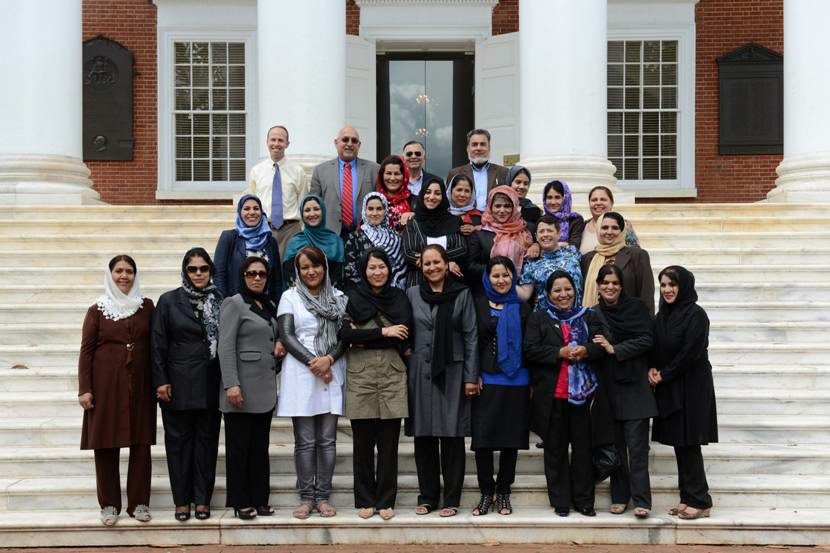June 5, 2012 — The rule of law is so fundamental to democracy and civil society that Americans often take it for granted.
That attitude, and a lack of formal education about the rule of law – it's mentioned just once in the hundreds of pages that define Virginia's Standards of Learning – endanger the health of our democracy, according to the Virginia Bar Association's Rule of Law Project, created in 2008 by Roanoke attorney Michael Pace Jr. during his term as president of the Virginia Bar Association.
On Thursday, Pace and another leader of the project spoke with a group who profoundly understand the importance of the rule of law: a delegation of 22 Afghan government officials and civil society leaders – all women – visiting Charlottesville as part of an international outreach program created by the University of Virginia Center for Politics.
Afghanistan is wracked by violence and terrorism and a resurgent Taliban, and lacks basic security in many provinces, the Afghan women explained through a translator. With a constitution less than nine years old and a nascent, marginally functional judicial system that has no presence at all in many of the nation's more rural districts, Afghans live daily with the consequences of a lack of rule of law, including corruption, injustice, harassment and denigration of women.
A well-functioning rule of law requires four elements, Pace explained. The government and officials must be accountable to the law. Citizens must actively be engaged in making the laws that govern them. Laws must be applied fairly and equally to everyone. "Most important, citizens agree to obey the law, even when we may disagree with that law," he said. "When you apply those four principles to civil society, you have stability, opportunity and hope."
The delegation is visiting America for three weeks through the U.S.-Afghanistan Professional Partnership Program, part of the Center for Politics' Global Perspectives on Democracy program, in partnership with Relief International and sponsored by the U.S. Department of State Bureau of Educational and Cultural Affairs.
The program focuses on the foundational principles of democratic governance as well as citizen participation and civic engagement in a democratic society, said Daman Irby, director of global initiatives at the Center for Politics.
Before returning to Afghanistan next week, Irby said, the group will have visited Virginia landmarks including Monticello, Montpelier, Jamestown and Williamsburg, and heard from prominent legal scholars, jurists and political figures, including Virginia Attorney General Ken Cuccinelli.
The delegation includes teachers, professors, lawyers, judges and leaders of non-governmental organizations. Many explained how they try to use the legal system to protect Afghan women's and children's rights against abuses like forced marriage, child marriage, domestic violence and exploitation of children.
Defense lawyer Hamida Saidi explained how she works as a public defender for women who often know nothing about the law and their rights. The whole concept of public defenders is new to Afghanistan, and their existence is slowly changing the behavior of judges, who are now calling on these new public defenders to represent people in court, she said. "Little by little, we are making a difference."
"The basic problem is the people don't know about the constitution and about their rights," said Latifa Sultani, the national coordinator for women’s rights at the Afghan Independent Human Rights Commission in Kabul.
Only well-educated Afghans and those working in government and civil society – perhaps 30 percent of the population – are well-informed about the nation's new constitution, Sultani said. All Afghans, she said, especially women and children, should be aware of their rights, the rule of law and the constitution, so they can hold their leaders accountable and make them obey the law.
"What you and we must do is teach the children, because the adults do not understand," Pace said. The Virginia Bar Association's Rule of Law Project offers a Web-based, interactive, free curriculum and partners teachers with lawyers and judges to teach rule of law to students in elementary, middle and high schools, as well as colleges.
Pace was joined by the project's education director, Timothy Isaacs, a veteran educator with a 42-year career as a teacher, coach, administrator and director of curriculum development for Roanoke City Schools.
"We both agree that Abraham Lincoln was correct when he said, 'Teach the children so it's not necessary to teach the adults,' " said Isaacs, alluding to a quote featured prominently in the project's website and handouts. Isaacs and Pace also pointed to a quote from John Adams in 1784: "There never was a democracy yet that did not commit suicide."
"We feel very strongly that to avoid John Adams' observation, we must teach the children," Pace said.
In Afghanistan, there is a push to teach the new constitution as part of the standard school curriculum, Sultani said. Currently, schools cover some basics of human rights, "but it is not enough."
Some Afghan leaders have resisted this push because "some of the people at the top in power themselves have a problem with rule of law and don't want it taught," said Asifa Saba, a supervisor with the Afghan Department of Education.
"Are you encouraged, based on these changes under way, that women's rights will be protected under your constitution?" Pace asked.
Murmurs of "yes" from many in group were followed by "Inshallah," meaning "God willing."
Helping people understand the rule of law will change your country, but it will take time, Pace told the group.
"We have been at this for well over 200 years now, and we are still a work in process," he said. "But one day, we will look the same."
Loud "yesses" from the group were followed by resounding "Inshallahs."
– by Brevy Cannon
Media Contact
Article Information
June 5, 2012
/content/afghan-group-visiting-uva-reflects-rule-law

